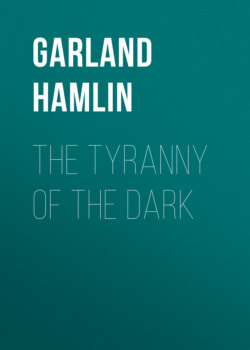Читать книгу The Tyranny of the Dark - Garland Hamlin - Страница 12
На сайте Литреса книга снята с продажи.
THE MAN
ОглавлениеTable of Contents
Meanwhile the young tourist had alighted before the door of the principal hotel, and, after writing his name in a clear and precise hand on the book in the office, had hastened to his supper, carrying a most vivid recollection of the slender figure and flushed and speaking face of the girl on the trail. That moment of meeting, accidental and fleeting, had already become a most beautiful climax of his pilgrimage. "She was born of the sunset; she does not really exist," he said, with unwonted warmth of phrase. "How could this little mining town produce so exquisite a flower?"
His grosser needs supplied, he lit his big student's pipe and went out upon the upper story of the hotel's rude porch, and there sat, listening to the rush of the stream, while the great yellow stars appeared one by one above the lofty peaks, and the air grew crisp to frostiness. He was profoundly at peace with the world and himself, his physical weariness being just sufficient to give this hour a sound completeness of content.
As the beauty of the night deepened, the girl's beauty allured like the moon. He still sought to explain her. "She is some traveller like myself," he said, "Bret Harte to the contrary, notwithstanding, the wilderness does not produce maids of her evident refinement and grace. She comes of a long line of well-bred people."
He was not an emotional person, and had not been permitted to consider pleasure the chief object, even of a vacation, but he went to his bed that night well pleased with Colorow, and with a half-defined sense that this was, after all, the point towards which his long journey, with all its windings, had really tended. However, he was not ready to acknowledge that a large part of the charm of the place was due to the glamour of a slender maid lit by the sunset light.
This delight in the town and its surroundings gained a new quality next morning as he looked from his window upon a single white cloud resting like a weary swan on the keen point of old Kanab. Though the mesas of New Mexico and the deserts of Arizona were his special field, he bared his head to the charm of "the high country."
Each summer, after months of prolonged peering into the hidden heart of microscopic things in his laboratory (he was both analytical chemist and biologist), it was his custom to return for a few weeks to huge, crude synthetic, nature for relief. After endless discussion of "whorls of force" and of "the office of germs in the human organism," he enjoyed the racy vernacular of the plainsman, to whom bacteria were as indifferent as blackberry-seeds. Each year he resolved to go to the forest, to the lake regions, or to the mountains; but as the day of departure drew near the desert and the strange peoples living thereon reasserted their dominion, and so he had continued to return to the sand, to the home of the horned toad and the rattlesnake. These trips restored the sane balance of his mind. To camp in the chaparral, to explore the source of streams, and to relive the wonder of the boy kept his faculties alert and keen.
His love of the sands and the purple buttes of the plain did not blind him to the beauty of coloring and the gracious majesty of these peaks, clothed as they were with the russet and gold and amber of ripened grasses, which grew even to the very summits (only the kingliest of the peaks were permitted to wear the ermine robes which denoted sovereignty); the Continental Divide was, indeed, much more impressive than he had expected it to be.
He was not one of those who seek out strange women, and he had no hope of meeting the girl of the mountain-side again. He was content to have her remain a poem—a song of the sunset—a picture seen only for a moment, yet whose impression outlasts iron. Everything in nature had converged to make her momentous. His long stay among the ugly, dusky women of the desert, his exultant joy in the mountain sunset, and his abounding health (which filled his heart with the buoyancy of a boy)—all these causes combined to revive emotions which his absorption in scientific investigation had set in the background—emotions which concern the common man, but which the deeply ambitious chemist, eager to discover the chemical molecular structure of the plasm, must put aside with a firm hand.
